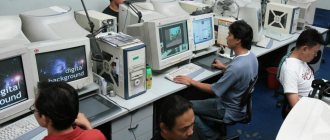Who is this?
In the absence of a systems analyst, the course of the above processes changes significantly. The development manager or programmers receive tasks from end users who rarely understand how to do this work correctly, as a result of which assistance to their developers in the process of creating a model is minimal. It is for this reason that programmers use their own model during the development process, simply agreed with the end user. According to experts, with this approach, a moment ultimately comes when this model either completely ceases to meet the real business requirements, or the project begins to be threatened by all sorts of contradictions within it. It is for this reason that any company that is on the path of modernization needs a systems analyst.
Where and how does it work?
Modern large companies have completely independent departments dealing with information technology, as well as automation of individual divisions of the company that are clients.
In this case, the systems analyst plays a key role in the company’s automation process, since he must develop a full-fledged consistent model of business requirements for what software should be implemented into it. To solve this problem, a specialist must have not only descriptive abilities, but, among other things, outstanding communication skills in order to find out the needs of his client in any conditions. In the vast majority of cases, a system analyst is initially involved in collecting requirements for released software products, and then is already involved in the development of technical creation for the formation of software, and is also involved in the design of documentation of software and system architectures of the IT system.
Among other things, this specialist is also involved in setting tasks for the development and testing of various utilities, and after the final completion of the project, he explains to users the basic rules for working with these utilities, and also takes upon himself the solution of functioning problems at each individual stage of the life cycle of the generated system.
Additional Responsibilities
Among the additional functions, there are usually tasks for recruiting personnel who will maintain a complex IT infrastructure, and creating an action plan in case of system failures. Here we also define the requirements for safe work and ensure information security. Reporting - creating an archive of contracts with performers, statistical data, and own reports on the results of project implementation - is also the responsibility of the specialist.
What kind of education is needed?
So far, today there are no educational institutions in Russia that provide training specifically in the “systems analyst” specialization. The Department of Business Analytics, opened in 2002 at the Faculty of the State University-Higher School of Economics, is not yet developed enough to boast of any truly successful projects on the part of its graduates. In the vast majority of cases, a business analyst must initially receive one or more higher educations, after which he takes the path of improvement and undergoes additional training.
Some experts say that the higher education that a person received at a truly well-known and respected university in a certain specialty related to economics or information technology can serve as the beginning of his formation in the profession of “systems analyst,” whose responsibilities are quite similar to what this specialist was trained. Among other things, experts also say that quite often in this profession you can find people with a higher mathematical education, as well as diplomas in the fields where they currently work. In the vast majority of cases, a person already receives the required knowledge in the field of business modeling through additional education.
History of the profession
The profession “System Analyst” (hereinafter referred to as SA) appeared on the labor market relatively recently, but, like most IT-related professions, it quickly gained popularity. Analyst is a noun from the word “to analyze”, which means that this position presupposes the comprehensive development of a person. The CA must have an understanding of not only information technology, but also an understanding of economics, marketing and management, as well as the industry in which his employing company specializes.
This specialist is so multifaceted that defining the boundaries of his activities is very problematic. The SA is also involved in working with clients, finding out what exactly they want to receive from the development team, and checking already written programs in order to find out whether this particular product can satisfy the client’s wishes; in addition, the system analyst also has responsibilities in formulating tasks for developers based on communication with clients. Simply put, it is almost the key link in any IT project.
Where can I get them?
Today, there are specialized courses on business modeling, as well as various methodologies for developing software systems, used by business analysts and designed to train specialists in various software products necessary for a high-level specialist. It is worth noting the fact that today, more often than others, knowledge of program languages is required from such a specialist as a systems analyst, whose responsibilities are directly related to specialized software.
Other names
It has already been said that only a comprehensively developed person will be able to occupy such a serious position as a systems analyst. The responsibilities that it implies are related to the possession of a huge amount of information from various spheres of social life. And to have a better idea of what an SA will have to do, you can look at what this profession is also called.
Some people use the title “IT project analyst.” In principle, it is not very different from the original one, but at the same time it emphasizes the main field of activity of the SA. “System architect” already shows that a specialist will have to design something, but at the same time, such a name can deceive those who do not have the slightest idea about the specifics of this profession: a SA can easily be confused with a programmer, for example, he also builds different projects. “Task Stater” is already much closer to the real picture: as mentioned above, based on communication with the client, the analyst formulates a task for the development team, transforming the customer’s abstract wishes into concrete information. “Project implementation engineer” sounds a little old-fashioned, and does not reflect the whole essence of the specialty - the analyst does not implement, he rather prepares for implementation. And the last of the names is “project manager”: given that the word “manager” comes from the English “manager”, we can say that the name is only partially correct: a systems analyst, whose job description is more related to communication and information processing, not is the immediate head of the project - perhaps one of his deputies, but not the leader.
Who else could such a specialist be?
As mentioned above, at the moment modern universities do not have the opportunity to train systems analysts, so for such specialists any specialty can be related. Of course, in order to take part in the automation process, a person must have the most modern knowledge in the field of information technology, but such knowledge can be present even in someone who has received a liberal arts education. So-called techies most often experience virtually no problems with various technical issues, while humanities specialists can more easily cope with lengthy negotiations with customers.
If you have a serious desire to master this profession, but at the same time you are not very versed in information technology, then you should start your career as an assistant or trainee. Only later, when you have mastered the field of business automation, will it be possible to create a resume for a systems analyst.
Next, we will consider the main responsibilities that this specialist undertakes.
Description of the profession
According to the Federal Professional Standard, which was approved by the Ministry of Labor of the Russian Federation in 2014, the activities of a systems analyst belong to the design and research area in the field of information technology. The purpose of his work is to develop requirements for software, hardware and software systems, products and means of production, and an automated control system during the project life cycle.
Enterprises that need such an employee are most often IT companies engaged in system integration or the creation of a finished product. However, an analyst may be needed by any organization involved in the implementation or development of an IT system: banks, telecommunications enterprises, consulting companies, etc.
A key role of a systems analyst is to develop requirements for a complete and internally consistent company automation model. To do this, the employee first gets acquainted with the requests that the new software product must satisfy (interviews, surveys), then develops a model and technical specifications. After completion of planned activities, he introduces the rules of operation of the system to its users.
In practice, secondary roles, characteristic of other professions, can be added to the main role:
- Business analyst . What distinguishes him from a systems analyst is that he improves the business model not only with the help of IT developments, but by any means. But since improving business processes today always depends on optimizing information technology, professional roles are beginning to converge.
- Technical Writer . The development of requirements is associated with their documentary presentation in the format of a system concept, as well as the writing of technical specifications, which is often performed by an analyst.
- System Architect. Often this is a separate specialist, but sometimes, together with him, an analyst is involved in the development of the technical component of the system, IT architecture options, determination of the logical data model and feasibility study of the choice.
Sometimes a systems analyst also has to perform the functions of a business architect, building a business model, developing work regulations, and dividing larger tasks into subtasks that require local automation.
The advantages of the profession include its prestige, high level of salaries and the ability to work remotely. The disadvantages are relationships with problem clients, changes in the boundaries and content of tasks already during the project, combination and unclear division of role functions.
Development of a company business process model
First of all, the resume of a systems analyst should be compiled in such a way that the head of the company understands that you will be able to develop consistent and complete models of the company’s business processes, based on direct communication with clients. Communication skills are given special attention for the reason that at least 35% of the total time of work of this specialist is devoted to communicating with clients and their employees. In particular, the difference between what a systems analyst and a business analyst is already evident here. The differences lie in the fact that a systems analyst forms a full-fledged model of business processes, while a business analyst collects the data necessary for management to make responsible decisions.
A system analyst can collect information in the following ways:
- Correspondence. In the vast majority of cases, it is used to save the company’s money and one’s own time when working with remote clients, as well as in the process of agreeing or discussing details. In this case, the specialist must be pedantic and accurate, have a perfect knowledge of the language, observe etiquette and style, and also be able to discuss the same issue with several addressees in correspondence.
- Questioning. It is mainly used at the initial stage of the survey or to evaluate the final results of the project. The specialist must have the skills to compile and develop a questionnaire, that is, he must be able to pose a problem, formulate a question and interpret the results.
- Interview. This form of communication with the client allows you to obtain the maximum possible information, especially if the specialist is well prepared and was also able to conduct several rounds of meetings simultaneously. If the interviewer was truly professional, then he will be able to interest the client, will assist him in preparing for the meeting using various preliminary questions, will have time to ask all the questions he needs in the allotted time, and will not lose any information between the work report and the answers received.
- Negotiations and meetings. The most important decisions in the life of any project are made here. What does a systems analyst do in this case? Helps the company achieve those decisions that will be the most productive and profitable for it.
- Work with documents. Of course, this is not a separate type of communication being considered here, but a systems analyst in any case must work with such sources of information. In this case, it is important to understand how the technological process is arranged, as well as to identify any possible inaccuracies or inconsistencies in the description that will need to be clarified before starting work.
Job Description for System Analyst
1004 General provisions
1004.1 This job description is the main regulatory and organizational document establishing the functions, rights and obligations, responsibilities of a systems analyst, regulating the organization of his activities, the procedure for business interaction with officials of structural divisions of XXX and other organizations.
1004.2 This job description is a document of direct effect, comes into force from the date of approval and is mandatory for execution by the employee from the moment of familiarization with signature.
1004.3 Appointment to a position and dismissal from a position are carried out by order of the director of branch XXX.
1004.4 The system analyst is directly subordinate to the senior system analyst of the information technology department of the branch “XXX - XX” (city __________) XXX, in his absence - to the head of the department or his replacement.
1004.5 The systems analyst is functionally subordinate to the deputy head of DIT for branch development.
1.6 A systems analyst may replace a senior systems analyst in the information technology department of a branch during his absence.
1005 Goals and job responsibilities
1005.1 The activities of a systems analyst are aimed at achieving the following goals:
1005.1.1 Coordination of information and technological development of the branch;
1005.1.2 Development of regulatory documentation for IT;
1005.1.3 Increasing the level of automation of technological solutions in the branch;
1005.2 To achieve established goals, the systems analyst performs the following responsibilities:
1005.2.1 Participates in the implementation of IT solutions in the branch;
1005.2.2 Controls the quality of information technology solutions;
1005.2.3 Collects and processes statistical data on failures and failures in the branch’s critical technical and information systems;
1005.2.4 Implements the implementation of standard technologies and application software in the branch;
1005.2.5 Participates in the design and development of solutions under OEBS;
1005.2.6 Maintains and supports software for conveyor lines (if available in the branch);
1005.2.7 Conducts training of branch personnel in new technologies and work with new application software.
1005.2.8 Describes the branch’s business processes related to IT and develops information technology documentation.
1006 Performance evaluation indicators
The activities of a systems analyst are assessed based on the following indicators:
3.1 Achieving goals and solving problems in the area of responsibility within the time limits established by the DIT strategic action plans and calendar plans;
3.2 Efficiency of using IT equipment in the branch’s technological processes.
1007 General corporate standards
The activities of a systems analyst are regulated by general corporate standards reflected in the following documents:
1007.1 Internal labor regulations;
1007.2 Enterprise standard “Business etiquette. Corporate dress code standard"
1007.3 DDD;
1007.6 Regulations on the protection of personal data of employees XXX;
1007.7 Regulations on the information technology department (ITO) of the XXX branch;
1007.8 This job description.
1008 Rights
The system analyst has the following rights necessary to perform his functional duties:
5.1 Receive any information required to perform your tasks from the management and employees of the XXX branch;
5.2 Make proposals to senior management on issues related to their competence;
1009 Responsibility
The system analyst is personally responsible to the director of the branch for failure to fulfill or improper performance of his functional duties in achieving established goals, as well as improper use of the rights granted to him:
— in accordance with the current labor legislation of the Russian Federation, internal regulations, and employment contract, the employee bears disciplinary liability;
— in accordance with the agreement on full individual financial liability, the employee bears financial responsibility.
1010 Requirements for an employee when hiring
| General mandatory requirements | ||
| 7.1 | Education | Higher technical |
| 7.2 | experience | From 2 years in specialty |
| 7.3 | Professional skills | Experience in modeling information technology processes, constructing flowcharts, ability to formulate and set a task for software development |
| Special Requirements | ||
| 7.4 | Knowledge of special software and technical systems | Knowledge of the Windows family of operating systems, Microsoft office products, the basics of building a LAN, the basics of building a database, the basics of software development |
| 7.5 | Knowledge of regulatory documentation | Undefined |
| 7.6 | Mastery of techniques | Undefined |
1011 Dictionary of special terms and abbreviations
| Term, abbreviation | Definition of term, abbreviation | |
| 8.1 | IT | Information Technology |
| 8.2 | DIT | State Enterprise Information Technology Department |
| 8.3 | LAN | Local area network |
| 8.4 | OEBS | (Oracle E-Business Suite): a set of business applications designed to create corporate ERP systems for enterprise resource management, customer relationship management systems and electronic trading platforms. |
| 8.5 | BY | Software |
| 8.6 | OS | operating system |
The instructions fully reflect the content and specifics of the activities of this official.
1012 Familiarization sheet
I have read the job description and accept obligations to comply with the performance standards established therein. I received a copy of the job description.
Detailed development of technical specifications
The next point in how a systems analyst differs from a business analyst is that this specialist must develop technical specifications in order to fully implement the requirements. Knowledge of the subject area, as well as full mastery of notations, allows the analyst to fully solve the problem of integrity and consistency of the model he is creating.
Skills in working with the latest software allow this employee to create uniformity in communication, regardless of whether he communicates with clients or developers, and moreover, he helps them find a common language. In the vast majority of cases, large companies prefer to initially adopt standards for describing business processes, as a result of which the specialty “system analyst” requires the ability to quickly study this information. Using this information, it will be necessary to project client requests into a language that is understandable to software developers.
In this case, the systems analyst is required to have knowledge of the architecture of the traditional solution of the supplier company, as well as the general principles of modern information system architectures. Concepts such as “distributed architecture”, “client-server” and others should be extremely clear to him. It is worth noting that this is not all that a systems analyst should do. He must be able to present product requirements, development features and all other information to people who are not specialists in this field, but at the same time must understand all the advantages and limitations of certain types of architectures. At the same time, developers should receive information from him about how the developed business model will be superimposed on the solution used.
Responsibilities at work
The labor functions and responsibilities of a systems analyst can be divided into the following categories, corresponding to 4 levels of specialist qualifications:
- Development of local system functionality and requirements for it. The employee may be an intern, junior systems analyst, consultant, or research engineer. He must study the operation of the system itself and its analogues, collect research results, accompany the development of user documentation and provide answers to questions raised by interested parties, and be able to take minutes of meetings.
- Development of requirements and technical specifications for systems of low or medium complexity. The specialist compiles them, including for subsystems, accompanies preliminary testing, creates operating regulations, trains users, identifies risks and processes requests for changes.
- Design of medium- and large-scale systems at the levels of concept and functional logic. In the Senior Systems Analyst position (research engineer or consultant), which can be assumed after 3 years of work at the previous level, the employee sets production goals, presents system concepts developed by him, organizes compliance assessments, generates reporting templates, and accompanies acceptance tests.
- Supervising the department and conducting analytical work. Occupying the position of leading systems analyst, head of a department or system analysis group, the employee (after 5 years of experience in the previous position) manages analytical structures, development processes, infrastructure, creates the analysis methodology himself, and also plans and controls related activities.
Among the requirements that are almost always mentioned in vacancies are knowledge of the basics of programming, SQL (structured query language), theories of algorithms and databases, and management skills.
Recording business process architecture
As the specialist receives information from the client regarding the modeling of the processes he is studying, appropriate documentation must be maintained. The exceptional integrity, as well as the relevance of each document participating in the project, will ultimately, if necessary, involve additional employees in its development. Otherwise, if the system analyst’s job description was not fulfilled and the manager decided to fire him, the knowledge that this specialist acquired in the process of working with clients leaves the company along with him.
Rights Senior Systems Analyst
3.1. The Senior Systems Analyst has the authority to take action to prevent and correct any violations or inconsistencies. 3.2. A senior systems analyst has the right to receive all social guarantees provided for by law. 3.3. The senior systems analyst has the right to demand assistance in the performance of his duties and rights. 3.4. The senior systems analyst has the right to demand the creation of organizational and technical conditions necessary for the performance of official duties and the provision of the necessary equipment and inventory. 3.5. The senior systems analyst has the right to familiarize himself with draft documents relating to his activities. 3.6. The senior systems analyst has the right to request and receive documents, materials and information necessary to fulfill his job duties and management orders. 3.7. A senior systems analyst has the right to improve his professional qualifications. 3.8. The senior systems analyst has the right to report all violations and inconsistencies identified in the course of his activities and make proposals for their elimination. 3.9. A senior systems analyst has the right to familiarize himself with documents defining the rights and responsibilities of the position held, and criteria for assessing the quality of performance of job duties.
Explanation of rules for working with the system
A separate role is assigned to the systems analyst in the process of implementing the developed software into some real business processes, because at this stage all the subtleties and features of not only the model, but also the architecture of the solution proposed to the client are fully revealed. In this case, you need to be able to find difficulties in a timely manner, and also, having a flexible model and an equally flexible solution, begin timely improvements in accordance with the customer’s requests.
Skills
Considering what a systems analyst does, the following key skills are worth highlighting:
- The ability to quickly understand requirements and prioritize them. At the same time, it is important to be able to tell the client in a language he understands about technical solutions and how they affect the business.
- Ability to use accepted methodology, document forms and notations in different projects.
- Skills in working with all necessary software.
- Skills in teamwork with other analysts if a whole team of professional specialists is involved in the development of the project.
- While maintaining an individual, creative work style, the Lead Systems Analyst must maintain consistent discipline regarding document management, logs, and revisions, and be willing to work closely with developers, testers, and architects.
- This specialist must, under any conditions, be able to demonstrate the competence of his company in a particular area, and ultimately, after a conversation, form an idea about the client and what requirements they put forward for the solution.
If we talk about how to become a systems analyst and what personal qualities a person should have, then first of all you need to be diligent and pedantic, and also fully feel the degree of your responsibility in the project being developed and not get involved in political and financial issues.
Work specifics
A person who thinks that what a systems analyst does is very close to the profession of his dreams must understand that he will not have to expect a normal work schedule: no one has canceled work with clients from other countries, time zone differences, and constant business trips for clarification of certain details of the project. In addition, when the project deadline approaches, you can completely forget about the standardized schedule.
But one of the advantages of such a life can be noted that IT companies are interested in their employees further developing, so they often offer foreign internships or trips to various specialized events. So a system analyst is simply guaranteed a wide circle of acquaintances.
Advantages
Among the advantages that the profession of a systems analyst provides to a person, it is worth highlighting the following:
- Quite a good level of remuneration, which is an order of magnitude higher than the average salary of other specialists.
- The need to apply an individual approach to each individual project, in connection with which a person fully reveals his creative abilities.
- The result of the work performed appears almost instantly, since the practical benefits of the implemented solution are visible almost immediately after the company’s workflow reaches a qualitatively new level.
- Using communication skills in the process of developing projects for different companies, a specialist gains a wide range of useful contacts.
Flaws
But, of course, the profession of “systems analyst” also has certain disadvantages, such as:
- Considering what a system analyst should know, such specialists are not present everywhere today, as a result of which one employee does not always work in a particular city and often goes on various business trips;
- disagreements or any disputes with the client are often the reason that he does not understand the differences between several systems, and his statement of the problem is too ineffective;
- quite often situations occur when users show a negative attitude towards the implementation of some radically new information system in a company, as a result of which the analyst must persistently and patiently explain its main advantages, and this is a waste of precious time and nerves.
How much do they earn?
In the vast majority of cases, system analysts earn approximately in the range from 45 to 150 thousand rubles monthly. It is worth noting the fact that the average compensation is quite high and reaches approximately 60 thousand rubles per month, which can be called evidence of the shortage of such employees in the labor market at the moment. It is worth noting the fact that these figures are reliable for Moscow, while in the regions such specialists may have a slightly lower salary compared to the capital.
How much do they get
The salary level for systems analysts depends on the qualifications and position offered in the open vacancy. The amount of remuneration in a third of proposals varies from 90 to 125 thousand rubles. The average salary in Russia is 90 thousand rubles, in Moscow and the region - more than 100 thousand. However, even in the regions that finish in the top ten of the ranking, monthly salaries do not fall below 60 thousand.
Senior specialists can count on 125–160 thousand rubles. and the presenters get even higher salaries.
Prospects
Experts often say that today such specialists are extremely in demand, and they are especially sought after by companies operating in the banking and investment sectors. Various financial corporations or specialized fuel and energy complexes are also promising for such professionals.
The extremely high demand for these specialists in integrator companies, whose business includes full automation and modernization of various processes performed by the customer company, deserves special attention.
The very concept of optimization and automation of various processes, even in the West, was formed only about 30 years ago, not to mention how young it is in Russia. However, today the need for specialists who can carry out complex engineering is constantly growing, and it can hardly be said that today there is a peak in demand. Due to the extremely low level of automation in public and private companies, we can say that the demand for systems analysts will only increase.






